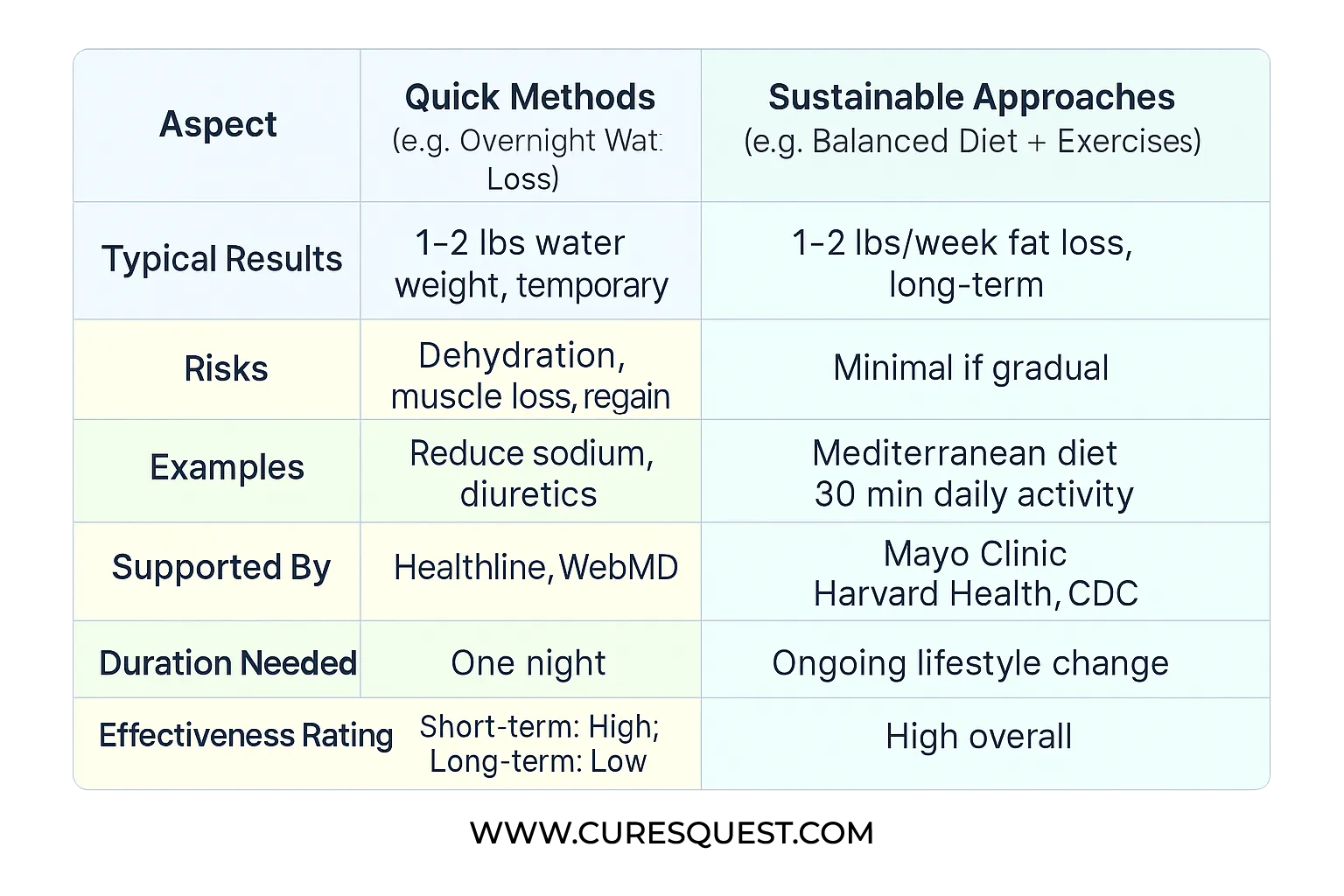Have you ever stepped on the scale in the morning and noticed a surprising drop, only to see it creep back up by evening? The allure of “how to lose weight overnight” draws millions searching for quick fixes in a world obsessed with instant results. While dramatic transformations like shedding 10 pounds in one night are the stuff of fad diets and misleading ads, research from credible sources such as Mayo Clinic and Harvard Health reveals a more nuanced truth. Overnight weight changes are possible, but they’re largely temporary and tied to water loss rather than fat burning. This article dives deep into the facts, offering safe, evidence-based tips to help you navigate this topic. We’ll explore what really happens to your body while you sleep, debunk popular myths, and provide actionable strategies for not just overnight tweaks but lasting health improvements. Whether you’re aiming to reduce bloating for a special event or kickstart a broader weight loss journey, understanding the science can empower you to make informed choices. Let’s unpack the realities behind overnight weight loss and how it fits into a balanced lifestyle.
Table of Contents
Is It Really Possible to Lose Weight Overnight?
The short answer? Sort of, but not in the way many hope. According to Healthline, most overnight weight loss is water weight, not fat. Your body is 55-75% water, and during sleep, you lose it through breathing and sweating—processes that can account for over 80% of any morning scale victory. This isn’t a magical fat-melting trick; it’s a natural fluctuation. For example, a single cup of water weighs about half a pound, so even minor dehydration overnight can shift the numbers.
Water Weight vs. Fat Loss: The Science Explained
Water weight, or fluid retention, builds up due to factors like high sodium intake, hormonal changes, or carbs that bind to water in your muscles. Fat loss, on the other hand, requires a calorie deficit over time—typically 3,500 calories per pound of fat. Overnight, your body does burn calories to maintain vital functions (your basal metabolic rate), but it’s minimal, often just 400-500 calories for an average adult. Studies from NCBI show that rapid weight loss diets can lead to initial drops, but much of it is water and muscle, not fat, increasing the risk of regain. Harvard Health emphasizes that sustainable loss comes from balanced diets like the Mediterranean or DASH, which prioritize whole foods over quick hacks.
How Much Weight Can You Actually Lose While Sleeping?
Estimates vary, but Medical News Today notes you might lose 1-2 pounds of water weight overnight through insensible loss (breathing and perspiration). Factors like room temperature, hydration levels, and dinner choices influence this. A hot night could mean more sweat, hence more loss, but it’s temporary. For context, one small study cited in Healthline found sleep deprivation alters hormones like ghrelin (increasing hunger) and leptin (decreasing satiety), potentially sabotaging efforts. Aim for consistency rather than extremes.

Safe and Effective Ways to Reduce Water Weight Overnight
While you can’t target fat overnight, reducing water retention is achievable and safe if done moderately. CDC recommends gradual loss of 1-2 pounds per week overall, but for short-term de-bloating, focus on these tips. If you’re looking for more beginner-friendly strategies to manage your weight and keep it off safely, check out these weight loss tips for beginners for practical guidance.
Dietary Adjustments for Quick Results
- Cut sodium: High-salt foods cause your body to hold water. Swap processed snacks for potassium-rich options like bananas or spinach, which act as natural diuretics. Mayo Clinic suggests limiting sodium to 2,300 mg daily.
- Stay hydrated: Ironically, drinking more water (aim for 8-10 glasses) flushes excess fluids. Add lemon or cucumber for flavor and mild detox effects.
- Incorporate diuretics: Green tea or dandelion tea before bed can help, as they boost urine output without dehydration risks. A study in PubMed supports their mild effects.
- Avoid carbs late: Carbs store water in muscles; opt for protein and veggies in your last meal.
Lifestyle Habits That Make a Difference
- Elevate your legs: Before bed, lie with legs up to reduce swelling.
- Manage stress: Cortisol from stress promotes retention; try meditation.
- Limit alcohol: It dehydrates initially but leads to rebound retention.
For evidence-based hydration tips, see Harvard Health’s guide.
Nighttime Routines to Support Weight Management
WebMD’s slideshow outlines habits that indirectly aid weight loss by improving sleep and curbing cravings.
Optimizing Sleep for Metabolic Health
Sleep 7-9 hours in a cool, dark room (66-70°F) to boost melatonin and regulate hunger hormones. Poor sleep increases ghrelin by 28% and appetite by 23%, per a study in Healthline. Dim lights an hour before bed and avoid screens.
Pre-Bed Exercises and Relaxation Techniques
Light walks or yoga, but not intense workouts close to bedtime. Brush teeth after dinner to deter snacking, and keep evenings busy with hobbies to avoid boredom eating.
(Embed YouTube video: Mayo Clinic’s tutorial on sleep hygiene for weight loss. Alt text: “Video on how sleep aids in losing weight overnight.”)
Common Myths About Overnight Weight Loss Debunked
Myths abound, often fueled by fad diets. Mayo Clinic debunks several in their resources.
Myth 1: Extreme Diets Lead to Lasting Fat Loss Overnight
Reality: VLCDs (800 calories/day) cause quick drops but mostly water/muscle loss, with high regain rates. MedlinePlus warns they’re only for supervised cases.
Myth 2: Supplements or Detoxes Can Melt Pounds While You Sleep
Reality: No pill burns fat overnight; many are unregulated and risky. Focus on whole foods.
Myth 3: Skipping Dinner Guarantees Weight Loss
Reality: Late-night eating matters more; Harvard notes it increases hunger and fat storage.
Long-Term Strategies for Sustainable Weight Loss
Overnight tweaks are starters; real change is gradual. Mayo Clinic’s six strategies include readiness assessment and inner motivation.
Building Healthy Eating Habits
Adopt plant-based foods, whole grains, and lean proteins. Harvard’s Healthy Eating Plate: half veggies/fruits, quarter grains, quarter protein.
Incorporating Exercise and Movement
30 minutes daily, plus strength training. Park farther or take stairs.
The Role of Intermittent Fasting and Meal Timing
Fasting overnight (e.g., 16:8) may aid metabolism, per Harvard, but consult pros. NCBI on maintenance strategies here.
Comparison Table: Quick Weight Loss Methods vs. Sustainable Approaches

This table highlights why balance wins, based on sources like CDC.
Potential Risks and When to Consult a Professional
Rapid loss can cause gallstones, nutrient deficiencies, or slowed metabolism. If you lose more than 2 lbs/week unintentionally, see a doctor—Cleveland Clinic flags it as a red flag. Pregnant individuals or those with conditions should avoid.
FAQs
What causes overnight weight loss?
Mostly water loss from breathing and sweating, as per Medical News Today.
Can I lose belly fat overnight?
No, but reducing bloating via low-sodium meals helps appearance temporarily.
Is intermittent fasting safe for overnight weight loss?
It can be, but Mayo Clinic advises medical supervision for some.
How does sleep affect weight?
Poor sleep boosts hunger hormones; aim for 7-9 hours.
What foods help lose water weight quickly?
Potassium-rich like avocados, per USC blog.
Are there risks to trying to lose weight overnight?
Yes, like dehydration; focus on safety.
How can I prevent weight regain after overnight loss?
Incorporate habits like regular exercise, per NCBI.
Does drinking water help lose weight overnight?
Yes, it reduces retention; Johns Hopkins supports increased intake.
Conclusion
In summary, while “how to lose weight overnight” isn’t a path to permanent fat loss, understanding water weight and adopting safe habits like better sleep and reduced sodium can provide a motivational boost. Research from Mayo Clinic and Harvard Health underscores that true success lies in sustainable changes—eating whole foods, moving more, and viewing weight as part of overall wellness. Start small tonight: try a relaxing routine and track your progress. Ready to commit? Sign up for our newsletter for weekly tips or download our free weight loss planner. Remember, patience and consistency trump quick fixes every time.
Key Citations:
- Healthline on Overnight Weight Loss
- WebMD Nighttime Habits
- Mayo Clinic Weight Loss Strategies
- Harvard Health Diet Topics
- MedlinePlus Rapid Weight Loss
- Medical News Today Sleep Weight Loss
- CDC Losing Weight Steps
- NCBI Weight Maintenance
- Cleveland Clinic Unexplained Loss
- Johns Hopkins Intermittent Fasting







